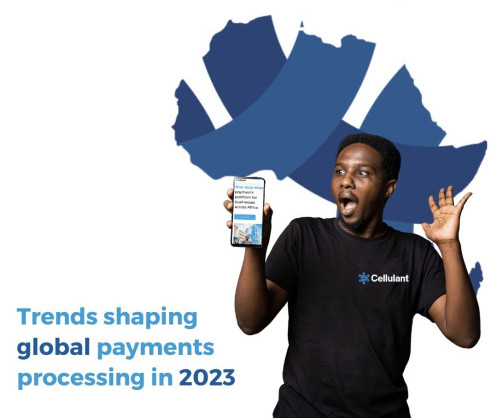A global payment processing system is a network that enables financial institutions to process cross-border payments. It allows for currency exchange between banks and other financial institutions across borders. The system is used by businesses and individuals to make international payments, such as for goods and services purchased online.
Currently, this system is going through radical changes that are transforming how individuals and businesses send and receive money. Furthermore, there are several exciting trends emerging that will shape the way businesses and consumers process payments worldwide. From cryptocurrency and contactless transactions to artificial intelligence, these innovations are set to transform the industry as we know it.
What is a payment processor?
A payment processor is a financial institution that provides the technology and infrastructure necessary to facilitate global payment processing. Payment processors work with acquiring banks to provide merchants with the ability to accept credit card and debit card payments from customers around the world. Payment processors typically offer a suite of payment-related services, including merchant account management, payment gateway (https://apo-opa.info/42IetFv) and point-of-sale (POS) services, fraud prevention, and security solutions, and access to financing products. In addition, many payment processors offer value-added services such as loyalty programs, customer data analytics, and marketing assistance.
How big is the global payment industry?
A report by the Business Research Company suggests that the global payments market (https://apo-opa.info/3ZsekTH) will record a growth of $612.04 billion in 2023 at a compound annual growth rate (CAGR) of 8.9%. Additionally, the report indicates that the global payments market will grow to $847.59 billion in 2027 at a (CAGR) of 8.5%. To begin with, new real-time payment platforms allow consumers and businesses to transfer money quickly, securely, and reliably across different banks and institutions. Again, there is an increased focus on security and data privacy (https://apo-opa.info/431uF4X) regarding payment processing. For instance, financial institutions are implementing more robust authentication processes to protect against fraud, as well as introducing new technologies such as biometrics and blockchain to strengthen security.
Trends reshaping payment processing in Africa
How we make and receive payments (https://apo-opa.info/3JVIxVx) is changing rapidly, and Africa is at the forefront. What’s more, new technologies and trends in global payment processing are reshaping the continent, making it easier for businesses to trade with each other and with the rest of the world. One of the most significant changes is the growth of mobile money. Equally important, more and more people in Africa are using their phones to send and receive payments, thanks to platforms like M-Pesa in Kenya and MTN Mobile Money in Ghana.
Additionally, payment gateways like Tingg (https://apo-opa.info/42IetFv) are reshaping how to send and receive money online in Africa. This makes it easier for businesses to transact without going through a traditional bank. Another trend that’s reshaping Africa is the rise of blockchain technology. Blockchain allows for secure, fast, and cheap transactions without a middleman. This could potentially revolutionize African economies by making it easier to move money around without losing value through exchange rates or fees. These trends are just some ways that global payment processing is changing Africa. They’re making it easier for businesses to trade with each other and connect with the rest of the world.
Is cash declining?
The decline of cash has been a long time coming. For years, experts have predicted the death of cash as we know it, and while that hasn’t happened yet, the writing is on the wall. Moreover, several factors are driving this shift away from cash.
Perhaps most importantly, technological advances have made alternative payment methods more convenient and secure. At the same time, consumer behaviour is changing, with younger generations, in particular, preferring digital payments. Interestingly, a survey from McKinsey indicates that the domination of cash in Africa will be challenged soon as e-payments become increasingly popular (https://apo-opa.info/3JThrOT). Banks and nonbank organizations are trying to simplify domestic and international payments.
All of this is having a significant impact on the payments industry. Companies that process card payments are seeing rapid growth. Despite the digital revolution, adopting electronic payment methods in Africa is still not widespread. Although cash use is diminishing, it remains the primary means of transaction in African nations. This shift will likely continue in the years ahead as more consumers and businesses move away from cash.
Here are trends shaping global payment processing:
Mobile wallets
As mobile commerce continues to grow, so does the demand for mobile wallets. A mobile wallet is a digital wallet that allows users to make payments and access their funds using a mobile device. In 2023, it is estimated that there will be 1.31 billion proximity mobile payment transaction users (https://apo-opa.info/3ZpPcwV) worldwide, up from 950 million users in 2019.
The most popular type of mobile wallet is the smartphone wallet, which allows users to make payments and access their funds using their smartphone. Other mobile wallets include NFC wallets, which use Near Field Communication technology to enable contactless payments, and cloud-based wallets, which allow users to store their funds in the cloud and access them from any device. With more and more people using mobile devices to pay for goods and services, it is clear that mobile wallets are here to stay. As such, businesses must ensure they can accept payments via mobile wallets (https://apo-opa.info/3JVIxVx) to stay ahead of the competition.
Cryptocurrencies
The report indicates that the global payments market will grow to $847.59 billion in 2027 at a (CAGR) of 8.5%
Cryptocurrencies are digital or virtual tokens that use cryptography to secure their transactions and control the creation of new units. Besides that, Cryptocurrencies are often traded on decentralized exchanges and can also be used to purchase goods and services. Bitcoin remains the largest cryptocurrency by market capitalization, followed by Ethereum, Tether, Binance Coin, and Cardano.
Cryptocurrencies have seen significant growth in recent years, fueled by increased interest from retail and institutional investors. However, cryptocurrencies face scalability issues, regulatory uncertainty, and a lack of mainstream adoption. Nevertheless, the cryptocurrency industry is expected to grow in the coming years.
As digital currencies continue to grow in popularity worldwide, Africa is emerging as a critical market for these new types of payments.
Global payment processing companies are noticing this trend and investing in African countries to tap into this growing market. Blockchain is a distributed ledger system that makes it difficult for anyone to hack or tamper with transactions. Reports indicate that In 2023, more than two dozen nations (https://apo-opa.info/3JXb7po) are expected to take a giant leap with the piloting of CBDCs. Several countries, such as Australia, Thailand, Brazil, India, South Korea, and Russia, already have plans to begin or further their pilot testing.
The growth of e-commerce
The e-commerce industry is expected to overgrow in the coming years. In 2023, the global e-commerce growth rate is expected to grow by 10.4%, bringing global e-commerce sales (https://apo-opa.info/40GSsoK) to $6.3 trillion.
Several factors will drive this growth:
1. The continued expansion of the internet and mobile devices.
2. The rise of social media and mobile commerce
3. The increasing popularity of online shopping.
In addition to this overall growth, there are a number of other trends that are shaping the global payment processing industry. These include the rise of alternative payment methods, the increasing use of mobile apps for payments (https://apo-opa.info/40JQDY8), and the growth of cross-border e-commerce. Alternative payment methods, such as digital wallets, are becoming increasingly popular as consumers seek more convenient and secure ways to pay for online purchases.
Biometric authentication
The need for secure authentication methods grows as the world becomes increasingly digitised. Biometric authentication, which uses physical or behavioural characteristics to verify identity, is one of the most promising technologies.
Several factors are driving the adoption of biometric authentication in the payments industry.
- Consumers are becoming more comfortable with using biometrics for authentication. This is due to the widespread use of smartphone fingerprint scanners and facial recognition technology.
- Biometric authentication offers higher security than traditional methods like passwords and PINs. It is much harder for criminals to steal someone’s identity or to spoof their credentials.
- Biometric authentication is becoming more affordable as the technology continues to mature. This is important for financial institutions that must balance security concerns with cost considerations.
- Some major payment processors are beginning to support biometric authentication. Some companies like Mastercard notably unveiled fingerprint and iris scanning (https://apo-opa.info/3zdzyKa) into their global network and have embraced biometric authentication.
- Government regulations are starting to catch up with the times. This is likely to spur even greater adoption of biometric authentication in the payments sector in the future.
Global payment processing and regulation
The impact of regulation on payment processing (https://apo-opa.info/3lS4Kvu) is far-reaching. Compliance with regulations such as the Payment Card Industry Data Security Standard (PCI DSS) is costly. In addition to the financial impact, compliance with these regulations imposes significant operational burdens on businesses. These requirements are challenging for small and medium-sized companies in particular.
Despite the challenges, businesses need to stay compliant with payment processing regulations. Non-compliance can lead to severe penalties, including fines, reputational damage, and loss of business.
Conclusion
Global payment processing will be pretty different in the future from what it is today. As technology advances, we will see more secure and efficient payment methods. Additionally, the need for transparency and faster transactions are pushing forward global payment processing trends such as blockchain and fintech. With all these changes coming our way in 2023, businesses should stay competitive (https://apo-opa.info/3KdHdxx) in an ever-changing marketplace.
















